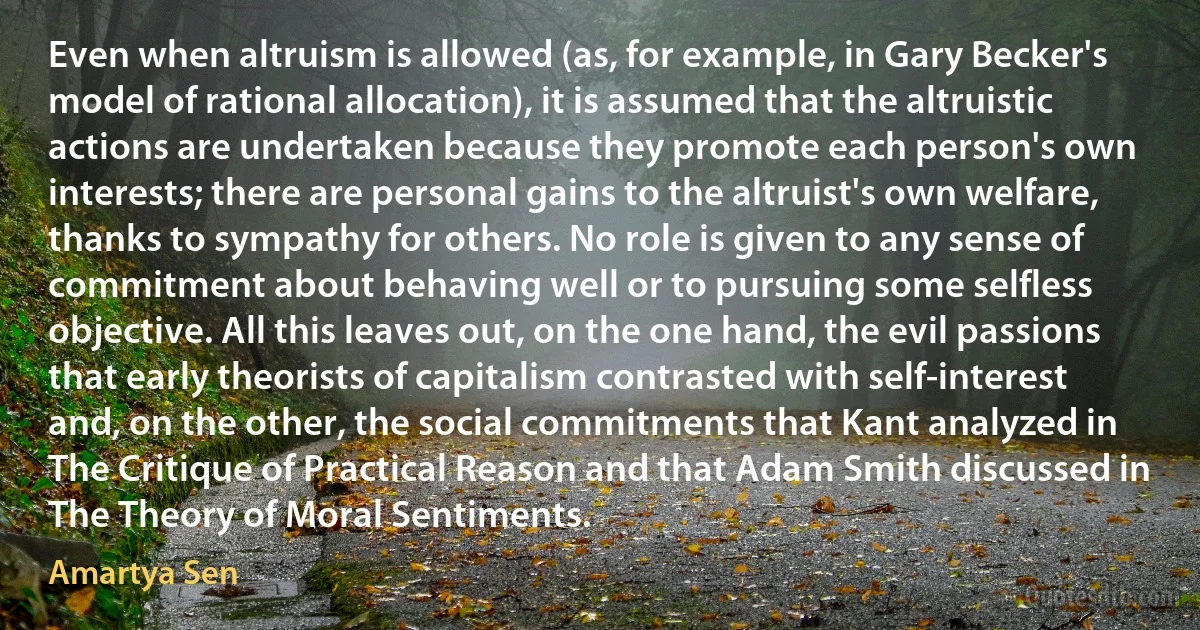
Even when altruism is allowed (as, for example, in Gary Becker's model of rational allocation), it is assumed that the altruistic actions are undertaken because they promote each person's own interests; there are personal gains to the altruist's own welfare, thanks to sympathy for others. No role is given to any sense of commitment about behaving well or to pursuing some selfless objective. All this leaves out, on the one hand, the evil passions that early theorists of capitalism contrasted with self-interest and, on the other, the social commitments that Kant analyzed in The Critique of Practical Reason and that Adam Smith discussed in The Theory of Moral Sentiments.
Amartya SenRelated topics
adam allocation altruism critique early evil example given hand leaves model objective reason self-interest sense thanks well others kant garyRelated quotes
At the one end of the scale are the Communist countries: at the other end the United States of America stands for individual liberty in the political sphere and for the maintenance of human rights. But its economy is based on capitalism, with all the problems which it presents, and with the characteristic extreme inequality of wealth in its citizens... Great Britain, like the other countries of western Europe, is placed geographically and from the point of view of economic and political theory between these two great continental States... Our task is to work out a system of a new and challenging kind, which combines individual freedom with a planned economy, democracy with social justice.

Clement Attlee
Economic history has contributed significantly to the formulation of economic theory. Among the economists who have found history an important source for their ideas are Smith, Malthus, Marx, Marshall, Keynes, Hicks, Arrow, Friedman, Solow, and Becker. Failure to take account of history, as Simon Kuznets (1941) stressed, has often led to a misunderstanding of current economic problems by investigators who have not realized that their generalizations rested upon transient circumstances. Nowhere is the need to recognize the role of long-run dynamics more relevant than in such pressing current issues as medical care, pension policies, and development policies.

Robert Fogel
In the name of liberty you have done what liberty disowns. In the name of theoretical progress, you have opened the door to practical retrogression. In the name of appeasement and the popular will, you have prescribed a course of endless irritation. ... He has won his victory; he has won the victory for which he has fought hard, and long, and adroitly; but it is not a victory, in our opinion, for the interests of this country, nor a victory for the welfare of the peoples of India, and in the crashing cheers which no doubt will hail his majority to-night, we pray there may not mingle the knell of the British Empire in the East.

Winston Churchill
The central psychological endeavor of Kierkegaard may be summed up under the heading of the question he pursued relentlessly: How can one become an individual? The individual was being swallowed up on the rational side by Hegel's vast logical "absolute Whole," on the economic side by the increasing objectification of the person, and on the moral and spiritual side by the soft and vapid religion of his day. Europe was ill, and was to become more so, not because knowledge or techniques were lacking but because of the want of passion, commitment. ""Away from Speculation, away from the System," he called, and "back to reality!"

Rollo May
[S]cientists are not robotic inducing machines that infer structures of explanation only from regularities observed in natural phenomena (assuming, as I doubt, that such a style of reasoning could ever achieve success in principle). Scientists are human beings, immersed in culture, and struggling with all the curious tools of inference that mind permits [...]. Culture can potentiate as well as constrain-as Darwin's translation of Adam Smith's laissez-faire economic models into biology as the theory of natural selection. In any case, objective minds do not exist outside culture, so we must make the best of our ineluctable embedding.

Stephen Jay Gould
